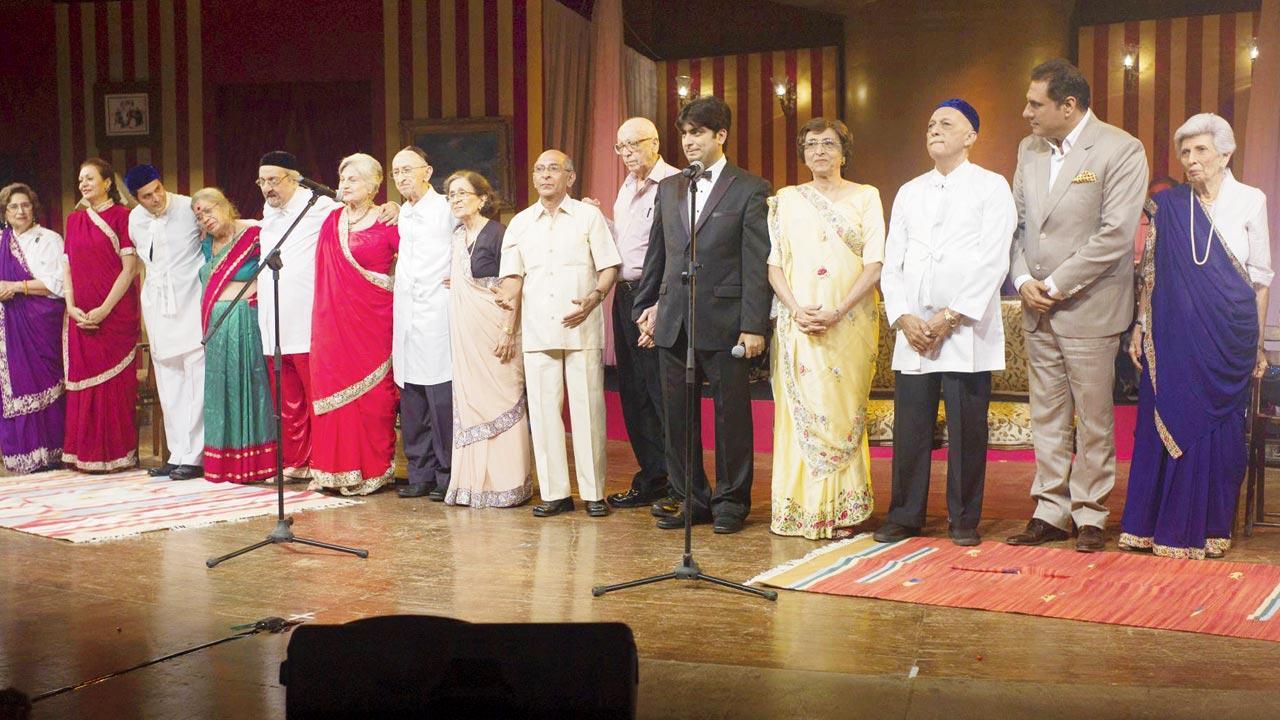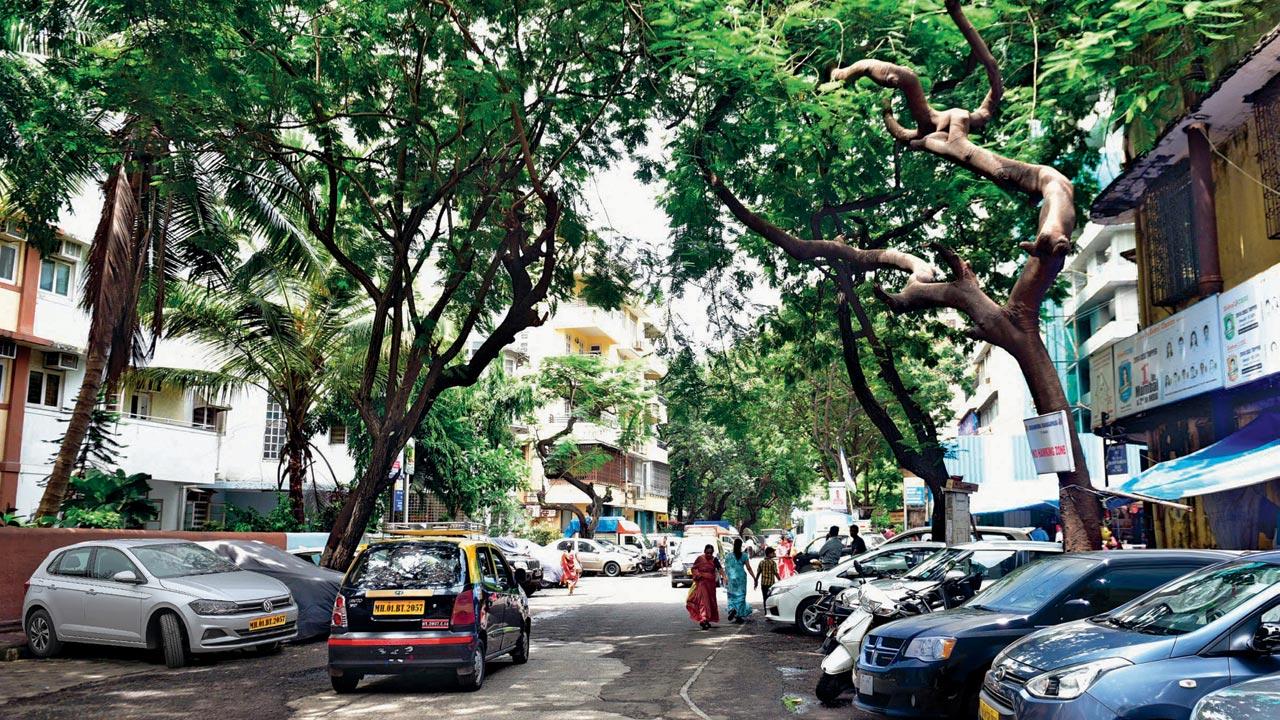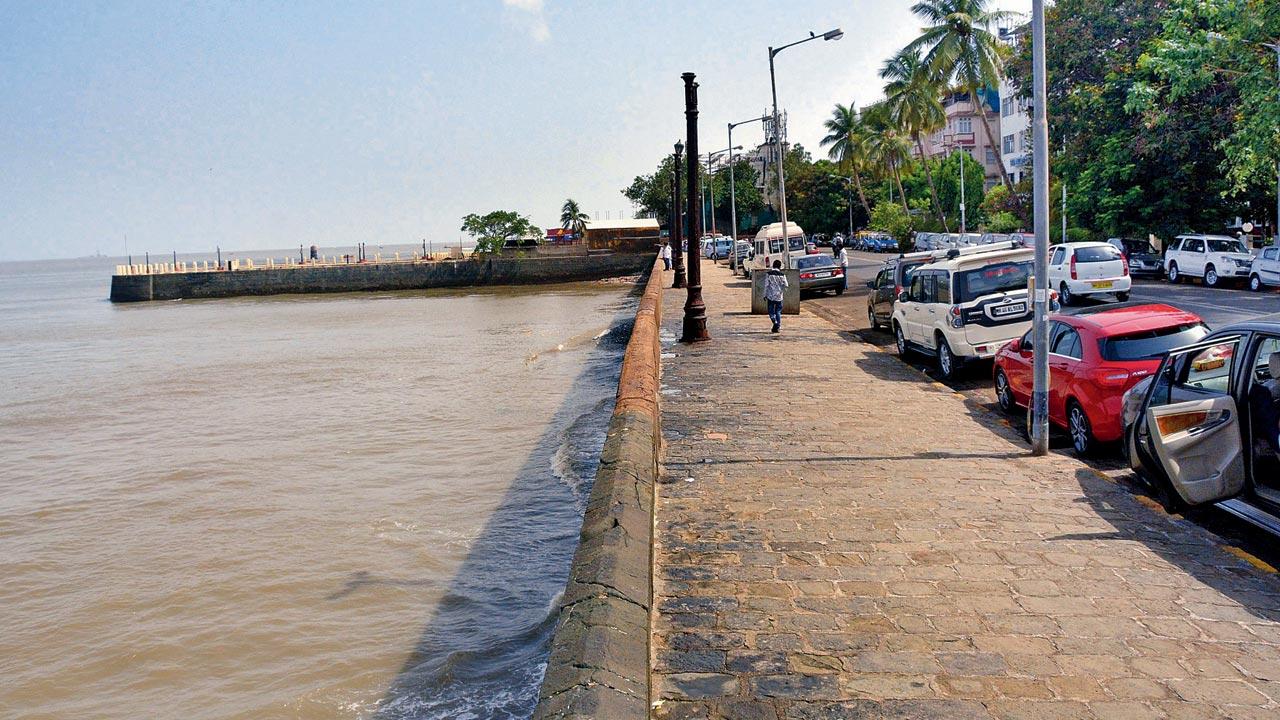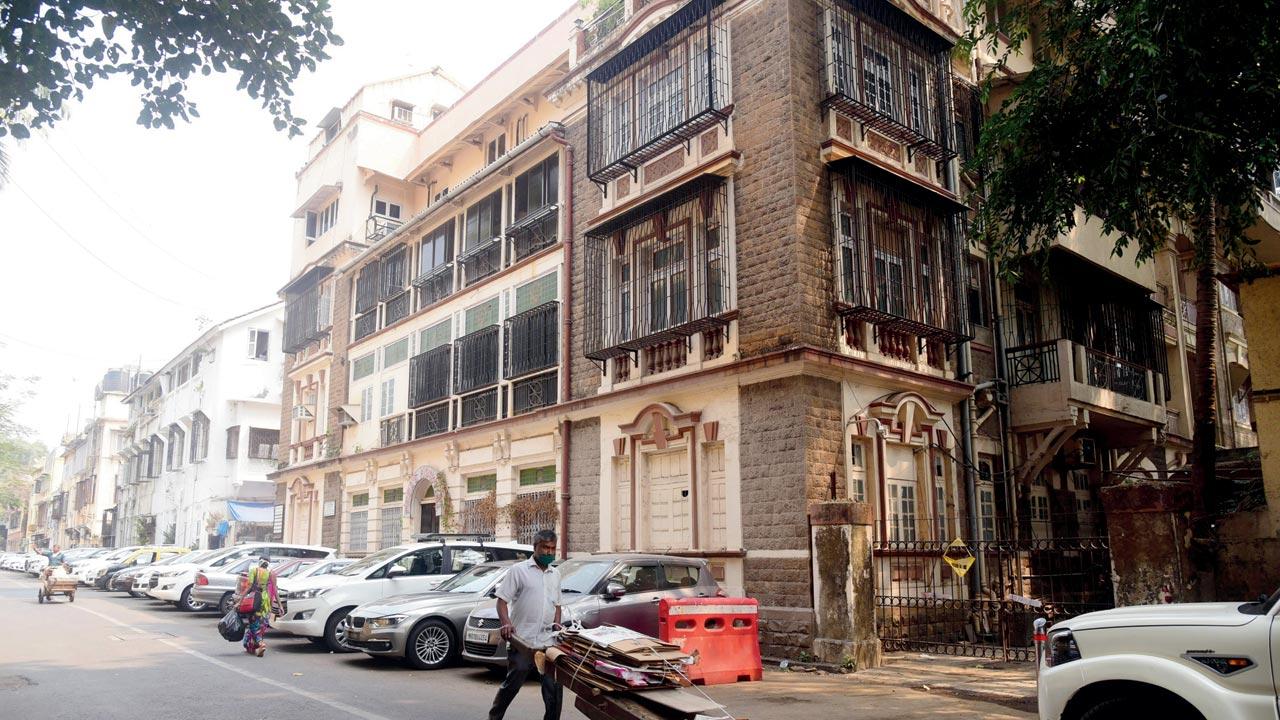Old verse and new memes mirror the many moods of Bambai hamaari jaan knitting us culturally closer

Jerry Kumana, Pheroza Modi, Shahrukh Irani, Uma Pocha, Rohinton and Scheherazade Mody, Burjor and Ruby Patel, Marazban Mehta, Sam Kerawalla, Jim Vimadalal, Dolly and Bomi Dotiwala, Boman Irani, Villoo Kapadia. Pic/Sooni Taraporevala
 Anderi ganderi tipri ten
Anderi ganderi tipri ten
Eisen meisen jolly good man
O mister ketla vaagya
8-9-10?”
ADVERTISEMENT
This was the charming ditty children from the Dadiseth lanes around Babulnath-Chowpatty shrieked with gusto in the 1960s. They chanted it hopping excitedly around their favourite vendor, who packed small portions of boiled peanuts and ganderi (peeled sugarcane pieces) they craved as a daily fix. “Safe to have streetside snacks in those years when every road was hosed sparkling clean from water tankers pulled by bullock carts,” remembers a parent.
 Sleater Road, where a local matka king shouted out amusing ditties. File pic
Sleater Road, where a local matka king shouted out amusing ditties. File pic
Nonsense rhyme and lilting limericks, folksy fun and soulful verse have warmed every corner of a city offered hundreds of more formal literary paeans. As vitally capturing people and places that shaped quintessential Bombay, lighter poems and phrases colourfully cover everything—city transport, scenic spots, landmarks and monuments.
A pity we lose plenty of rhythm and beat, much metre and cadence, reading these in print here rather than recited. Even relatively silent they provide entertaining, emotional reading.
 Apollo Bunder and the old Colaba lighthouse have inspired catchy verse
Apollo Bunder and the old Colaba lighthouse have inspired catchy verse
Writer Aban Mukherji sings me a cheerful tangawala’s invitation to children for a joyride in his horse carriage. Part of The New Era School’s pre-primary repertoire of rhymes composed and set to music by Indubhai Parekh, it goes:
“Aavo baba-bebi
Maari gaadi ma beso
Tamaney faravaa lai jaavu
Chowpatty ne dariye
Paalavaa Bunder
Kamala Nehru Park ne
Rani Baug bataavu.
Ghoda gaadi, ghoda gaadi
Maari tabdak-tabdak chaaley ghoda gaadi
Maari ghoda gaadi chaaley jaaney motor gaadi chaaley
Tabdak-tabdak taale maaro ghodo kevo mahaale
Come, boys and girls
Hop into my horse carriage
Driving you past Chowpatty beach by the sea
To Paalavaa Bunder
I’ll show you Kamala Nehru Park
And Rani Baug too.
Tabdak-tabdak flies my ghoda gaadi
It races past like a speeding motorcar
As gaily prances my horse
To the tabdak-tabdak beat
Of hooves taking him far.”
 A children’s limerick remembers the sugarcane seller near De Sa Hospital and Chowpatty Band Stand. File pic
A children’s limerick remembers the sugarcane seller near De Sa Hospital and Chowpatty Band Stand. File pic
With the trot you hear ringing in the tangawala’s voice, Paalavaa Bunder is an allusion to Apollo Bunder. Palla, a herring family fish, was sold on these shores. Apollo is supposed to be an adaptation of paalavaa, a fishing vessel—“Paalavaa la jaavu ya” meant “Let’s go fishing.”
A verse describing the Colaba lighthouse in that vicinity is shared and translated by the wonderful Shanta Gokhale—always relied on for the most amazing insights on just about anything I seek. Its last line indicates the colonial times it must likely have been framed in:
“Kulabyachi daandi, daandivar diva
Daryaat ujed padlay ho
Khanderi-Underi ya don gaavaa
Madhye Kulaba gheto hava.
Mumbaikaraa tu distos kasa?
Tu gora gora, tu gora gora.
The lighthouse on Colaba daandi
Sheds its light in the sea
Between the isles of Khanderi-Underi
Colaba enjoys the breeze.
Man of Mumbai what do you look like?
You look white, you look white.”
In response to an earlier column on the Apollo Bunder row of handsome harbour-facing buildings, came this rant from “a Karachi advocate” who carped at the BIT (Bombay Improvement Trust):
“We may not have a Ballard Pier and passengers galore
We may not have a Taj Mahal upon our sandy shore
We may not live in an Apollo Bunder flat
But we haven’t an Improvement Trust and thank the Lord for that.”
From scepticism to optimism… A sunny attitude greeted me at Khodadad Circle, once Dadar TT (Tram Terminus). A florist settling for the day with baskets of blooms, had started to thread torans on the footpath fronting Dayaram Damodar Mithaiwala. He found himself already surrounded by a queue of irate housewives. Frazzled from what seemed a regular commute on overcrowded peak-hour trains running late, he tried to beat back the fatigue and smiled valiantly to placate waiting customers. They grew mollified by the mild manner graduating to good-natured smile, as he pointed to the sweaty T-shirt sticking to his chest in the scorching October heat. Across it, his young daughter had scrawled in paint what guaranteed to melt the angriest stance: “Haar ke aagey jeet hai, Dadar ke aagey seat hai.”
As a Central Line local slowed at various stations, students like Bharat Gothoskar in their years at Somaiya Engineering College, Vidyavihar would routinely burst into singing, “Sion aaya, Sion aaya/, Dadar, Matunga, Sion aaya”. This to strains of “Sayonara, sayonara…” from the film Love in Tokyo. Bemused fellow travellers grew to expect to hear this routine.
Our friend Jerry Pinto highlights his neighbourhood—typically within a quick minute—with evocative words strung together specially for this theme:
“I live in a space called Mahim.
Home to Ram, Ronnie, Rahim,
Sheetala Mata, Mother Mary and Guru Nanak.
With great bazaars for fish and paalak.
Parsi bawas make our pao
We live with no chiaow-miaow
For at the north end stands
St Michael
Guarding the gates of our
small miracle.”
A cosmopolitan mix of communities was also more flamboyantly hailed in a Grant Road gully. On Sleater Road, nearer Wimbridge Compound (where Edward Wimbridge, who designed the cover and engraved the heading of The Theosophist’s inaugural issue in 1879, had a furniture factory) residents recall amusing diversions. Roughly one block down, where a family brewed kegs of vinegar smelling tart for miles, the Sleater Road Parsi Mandal encouraged the lane’s little old ladies to glean gossip. A popular topic of discussion was the rambunctious adda of Ramu Dada, causing traffic jams at 8.30 on certain evenings. Throngs of gamblers gathered, each hoping to hit the satta jackpot. The matka king shouted a town crier-type refrain: “Bawa aao, buwa aao, bus naseebwala mat aao—Come one, come all, only the lucky mustn’t come.”
Speaking of good fortune. Which Irani cafe lover hasn’t encountered the late Boman Kohinoor of Britannia at Ballard Estate? Every bit as spry and spirited as we remember him from college days, the restaurateur served thousands of lunch customers history on a plate. The Kohinoor family had owned Britannia & Company since Boman’s father Rashid opened it in 1923, coincidentally the year Boman was born in Yazd.
Despite a stoop and slowed gait towards 2019 when the city lost him, bow-tie firm against wrinkled neck folds, Boman shuffled taking orders between tables layered with red-checked cloths. Engaging customers with personal attention lavished on them, he treated each to staccato-style couplets. Everybody’s predictable favourite whenever he recommended a cool drink was—“Try fresh lime soda sweet, to beat the Mumbai heat.”
From the mid-1950s, Parsi theatre presented uniquely adapted Gujarati lyrics which stars sang before the interval or as curtain closer. A rousing example of the former, from the pen of the inimitable writer-director Adi Marzban, would be chorused to the 1904 tune “Blue Bell” (albeit a complete departure from the original context of a soldier’s farewell to his sweetheart):
“Chhaiyyey hamey Zarthosti
Ek mek ne daiyyech gaar,
Dhansakh ne achaar gamey
Cricket ma khaiyyey maar,
Naatak, cinema, race ma
Nathi hamey pachhaat,
Lagan-Navjote ni ses ma
Peraavyech rupya saat.
Naach rang ni shaukheen
Khoob hasmukhi
Jeegarey dulli rehjey
O Parsi kaum
Tooj per chhey aafreen
Reh tu sukhi
Hamesaa hasti rehjey
O Parsi kaum.
We are proud Zoroastrians
Swearing at each other,
Dhansaakh and pickle lovers
Though we tend to lose cricket games
In theatre, cinema and the races
We sure never lag behind,
Weddings and Navjotes see us
Slip in gifts of 7 rupees.
Enjoying song, dance and festivity
We’re out to have good fun
A community so large-hearted
All blessings unto you
May you always stay happy
And full of laughter in the house
O ye Parsis!”
The traditional finale saw the entire cast of Marzban’s musical revues wave to madly clapping audiences. To the jaunty riffs of “When Irish eyes are smiling”, his actors chorused:
“Havey gup-chup gher jaavo
Nahi toh hall ma thi kaarsey bahaar
Gher jai ne faraaghaat thhaavo
Khaavaanu hosey taiyyar…
Naatak paachho jovo hoi
Hamesaa taiyyaar hamey
Pun ticket veychaati leyjo
Khoda bakhast na thhataa tamey!
Now it’s time to head home quietly
Or you’ll be thrown out of the hall
Go home, relax comfortably
Dinner is ready and waiting...
If you want to see the play again
We are ever ready to stage it
But do pay for your own ticket
Don’t shamelessly come without!”
Author-publisher Meher Marfatia writes fortnightly on everything that makes her love Mumbai and adore Bombay. You can reach her at [email protected]/www.meher marfatia.com
 Subscribe today by clicking the link and stay updated with the latest news!" Click here!
Subscribe today by clicking the link and stay updated with the latest news!" Click here!







